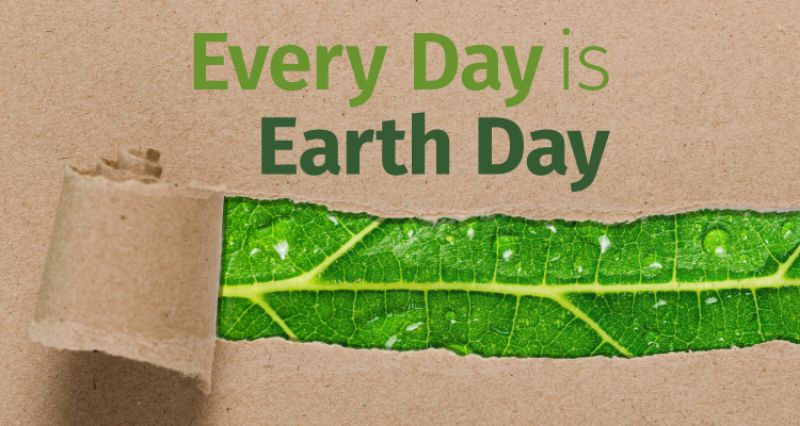Earth Day is April 22, but you can make every day Earth Day. One way is to reflect on our consumption habits and their impact on the environment. One significant area where innovation is rapidly progressing is in flexible packaging solutions. The development of recyclable and compostable flexible packaging stands out as a promising avenue towards sustainable practices for converters to consider.
Understanding the Problem
Traditional packaging materials, such as plastics, pose a significant threat to our planet. According to a UN study, plastic waste can take up to 500 years to decompose. S-One, the parent company of S-One Labels & Packaging (S-OneLP), has joined the United Nations Global Compact initiative— a call to companies to take action in support of UN goals and issues embodied in the Sustainable Development Goals. Launched in 2000, the UN Global Compact is the largest corporate sustainability initiative in the world.
The Rise of Sustainable Flexible Packaging
There is a realization within the packaging industry that change is necessary. Enter recyclable and compostable flexible packaging. These alternatives are part of S-OneLP’s commitment to a circular economy. Recycle. Reuse. Renew.
“We not only provide sustainable solutions, but we also offer resources so that converters can learn more about how our products lessen environmental impact,” stated Sharon Beeman, S-OneLP VP of Global Sales. “Discovering the benefits of eco-conscious products is the first step towards adding sustainable flexible packaging to an existing portfolio.”
Flexible packaging reduces waste in manufacturing and in consumption of the final product. A Flexible Packaging Association (FPA) report reveals flexible packaging requires less energy to manufacture and less material. Furthermore, its lighter weight decreases transportation costs. The final result: Less materials are sent to landfills.
Recyclable Flexible Packaging
Recyclable flexible packaging is designed to be collected, processed, and remanufactured into new products. S-OneLP’s ReTreve recyclable films are made up of coextruded polyethylene. These flexible packaging films meet the Sustainable Packaging Coalition guidelines for store drop-off recycling. By choosing materials that are widely accepted by recycling facilities, converters are facilitating the transition to a circular economy where packaging waste is minimized.
S-OneLP’s ReTreve films deliver high clarity or opacity, excellent heat seal strength, and high- moisture and oxygen barriers. This flexible packaging comes in 4 mil as well as 4.5 mil clear and white pouch films, 3.5 mil LLDPE sealant films, and 90-gauge clear MDO reverse print films, all of which are certified for store drop off. Flexible packaging converters have found success with the ReTreve line in applications including bar wrap and flow wrap, snack webs, pouches, and stand-up pouches.
Bio-based and Compostable Flexible Packaging
Compostable flexible packaging takes sustainability a step further by breaking down into natural components when exposed to environmental conditions. This means that they will eventually decompose into water, carbon dioxide, and biomass leaving behind minimal harm to the environment.
S-OneLP’s bio-based and compostable flexible packaging products include our selection of ReEarth flexible packaging films listed on the USDA BioPreferred Catalog available here. Our ReEarth portfolio includes 3.4 mil Metallized Stand-Up Pouch, 3.3 mil Clear Stand-Up Pouch, and 2.2 mil Metallized Snack Web.
The following ReEarth films have received TUV OK compost HOME and TUV OK compost INDUSTRIAL certification:
- REE34MSUP- ReEarth 3.4 mil Metallized Compostable Pouch Web, unprinted roll stock
- REE34MSUP – ReEarth 3.4 mil Metallized, Compostable Stand Up Pouch, printed, protected with overprint varnish (OPV), then sealed into a pouch
- REE22MSW - ReEarth 2.2 mil Metallized Compostable Snack Web, unprinted roll stock
We recently partnered with the USDA to celebrate National Biobased Products Day. S-OneLP selected the best raw materials on the market that allow for the quickest industrial composability. Watch the video below to learn more about our bio-based flexible packaging.
The Road Ahead
While the advent of recyclable and compostable flexible packaging is a step in the right direction, there are still challenges to overcome. Recycling infrastructure and education are essential to drive widespread adoption of these sustainable alternatives. Efficient collection and recycling infrastructure are critical for realizing the full potential of recyclable flexible packaging. Governments, businesses, and consumers must work together to invest in recycling facilities, improve waste management systems, and promote responsible disposal practices.
As we commemorate Earth Day, let us reflect on the importance of embracing sustainable practices in every aspect of our lives, including packaging. Recyclable and compostable flexible packaging offer a promising pathway towards reducing our environmental footprint and preserving the planet for future generations. By supporting innovation, investing in infrastructure, and raising awareness, we can pave the way for a more sustainable and eco-friendly packaging industry.
Together, let’s make every day Earth Day.For more information on our recyclable and compostable packaging, please call us at 941.256.7900, or email labelsandpackaging@sone.com.

